Certified organic fiber must be grown according to U.S. National Organic Program (NOP) standards without the use of toxic and persistent pesticides, synthetic fertilizers, or genetic engineering. USDA-accredited third-party certification organizations verify that organic producers (farmers) use only permissible methods and materials allowed under the NOP organic regulations
While USDA NOP regulations cover the production of raw agricultural commodities such as cotton and wool, the regulations do not include specific processing or manufacturing standards for textile products, such as t-shirts or mattresses. A product can be labeled as “organic” and make reference to NOP certification ONLY if it is produced in full compliance with both the NOP production standards (crops and livestock for raw materials) and the NOP handling standards (processing for the finished product). However, as most of these methods and ingredients are not applicable to textile processing, NOP labeling is likely unachievable for most garments and textile products that use a variety of dyestuffs and auxiliary agents.
Given the lack of processing standards under the NOP organic regulations, manufacturers may seek out certification for processed textiles through a reputable private standard called the Global Organic Textile Standard (GOTS). GOTS is a stringent voluntary international standard for the processing of textiles containing organic fiber. GOTS addresses the entire post-harvest processing (including spinning, knitting, weaving, dyeing and manufacturing) of apparel and textile products made with organic fiber.
Get Involved with OTA’s Fiber Sector Council OTA’s Partnership with Textile Exchange OTA's Best Labeling Practices for Textiles
Complying with SOE: Importing Organic Fiber and Textiles Quick Resources Organic Cotton Fact Sheet

Global Organic Textile Standard (GOTS)
Policy and Advocacy Updates
OTA is actively engaged in many projects to protect and promote the organic fiber and textile sector. From enforcing the user of organic claims on processed fiber and textiles to securing an alternative to Methyl Bromide, learn more about our current and on-going projects.
Quick Resources
What is organic cotton? What are organic fiber products and how can you label them? How does cotton affect the environment? Find the answers in our quick resources section.
Where to buy organic clothing and textiles
The organic cotton initiative has created guide that outlines where consumers can buy organic clothing and textiles. Be sure to look for the Global Organic Textile Standard (GOTS) label on garments and products to be sure that they are truly organic.
